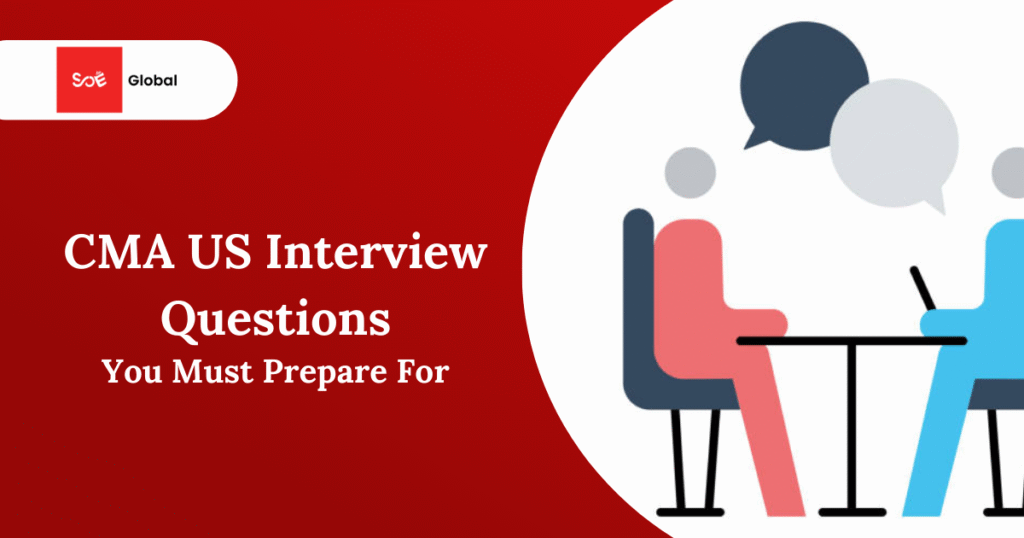Table of Contents
ToggleDid you know? According to the IMA’s 2023 Global Salary Survey, CMAs earn 55% more in total compensation than their non-certified peers. That’s because the CMA US credential signals expertise in financial analysis, decision-making, strategic thinking, and leadership skills employers prize.
But before you step into those lucrative finance roles, you must clear one major hurdle: the interview. Whether it’s for a multinational, a Big 4 firm, or your campus placement, the questions asked can be make-or-break. This guide covers the top 20 CMA interview questions, what recruiters expect, and how to craft winning answers, especially for CMA freshers entering the job market.

Ready for a High-Paying Career in Accounting & Finance?
Join our ACCA, CMA US & IFRS courses for real results.
Why Interviews Matter More for CMAs
When you apply for CMA roles like Financial Analyst, FP&A Associate, Management Accountant, or Budgeting Specialist, you’re expected to be more than just number-savvy. Companies, especially Fortune 500s look for:
- Strong communication skills
- Strategic business understanding
- Ethical decision-making
- Proficiency with tools like Excel, ERP, and Power BI
Interviewers want to see how you apply the CMA knowledge to real-world business scenarios. Especially in CMA campus placement interviews, they test both technical concepts and problem-solving mindset.
Let’s explore 20 essential interview questions for CMA freshers, with sample approaches and insights to help you stand out. Ace Your Next Interview with These Must-Know Insights for CMA Freshers
20 CMA US Interview Questions
General Questions
These gauge your personality, motivation, and communication.
1. Tell me about yourself.
Highlight your CMA journey, academic background, internships, and interests. Make your introduction interesting, interactive and a storytelling style.
Example:
“I recently completed Part 1 of my CMA and interned at a mid-sized finance firm where I worked on budgeting models. I enjoy analysing numbers to drive business strategy and am eager to work in a dynamic FP&A team.”
2. Why did you choose the CMA US certification?
Emphasise global recognition, focus on analytics, and alignment with your long-term goals.
3. What are your strengths and weaknesses?
Choose relevant soft skills (e.g. analytical thinking, stakeholder management) and show self-awareness.Give scenarios of where you contributed with your strengths and how you can turn your weaknesses into opportunities.
4. Where do you see yourself in 5 years?
Link your vision to your CMA path and your aspirations to grow into leadership or cross-functional roles.
Technical CMA Interview Questions
These are common in CMA campus placement interview questions and test your understanding of CMA content areas.
5. Explain the difference between budgeting and forecasting.
Budgeting is a detailed plan for income & expenses; forecasting updates projections based on current trends. Make the answer more interesting by adding relevant real life scenarios and examples to it that will highlight your understanding of the concepts.
6. What is variance analysis? How do you use it?
A technique to analyse differences between planned and actual performance. Share an example from your coursework or internship.
7. Define working capital and explain how to optimise it.
Show awareness of cash flow, inventory management, receivables, and payables.
8. What are the major cost accounting techniques you’ve learned?
Mention standard costing, ABC (Activity-Based Costing), marginal costing, and when to use them.
9. Explain ROI and how it helps in decision-making.
ROI = Net Profit / Investment. A key metric for evaluating investment performance.
10. What is the balanced scorecard? Why is it used?
A strategic management tool measuring financial and non-financial performance: Financial, Customer, Internal, and Learning metrics.
Scenario-Based and Behavioural Questions
Employers want to know how you apply CMA knowledge in real situations.
11. How would you handle a disagreement with your manager over a cost control recommendation?
Emphasise data-driven communication and openness to discussion.
12. You find an error in a financial report due just before a deadline, what do you do?
Highlight ethical judgment, attention to detail, and transparency.
13. A client wants you to modify a report to ‘look better’ how do you respond?
Refer to IMA’s Statement of Ethical Professional Practice and uphold integrity.
Company & Industry-Specific CMA Interview Questions
14. What do you know about our company and our business model?
Research well—check investor reports, recent news, and competitors.
15. How do you think CMA knowledge is applied in our industry?
Tailor your response to banking, tech, FMCG, or consulting—whichever you’re interviewing for.
16. What financial software or tools are you proficient in?
Mention Excel (pivot tables, modelling), ERP tools (SAP, Oracle), and if applicable, Power BI or Tableau.
CMA-Focused Questions
These questions often appear in interview questions for CMA freshers during selection processes.
17. Which topics did you find most challenging in CMA Part 1/Part 2?
Be honest, and mention how you worked to overcome those difficulties.
18. How has CMA helped you develop a business-oriented mindset?
Speak about connecting accounting concepts to strategic decisions.
19. What’s the difference between financial accounting and management accounting?
Financial accounting is for external stakeholders; management accounting helps internal decision-making.
20. How do you stay updated with changes in accounting and finance?
Mention IMA resources, LinkedIn, blogs, and finance podcasts you follow.
How to Prepare for CMA Interviews
Research the company thoroughly
Understand their business model, industry trends, competitors, and challenges.
Know your CMA syllabus and ethics
Employers respect candidates who understand how to apply knowledge, not just memorize theory.
Mock interviews help massively
Practice with mentors, friends, or platforms like SOE Global that offer structured interview coaching.
Frame your answers with STAR method
Structure answers with: Situation, Task, Action, Result—especially for scenario-based questions.
Practice. Prepare. Get Placed.
The CMA interview is not about knowing everything, it’s about showing that you’re willing to learn, can apply your knowledge, and think like a finance professional.
At SOE Global, our CMA US coaching includes placement training, mock interviews, and career mentorship so students not only pass the exams but also ace their first jobs. Whether you’re preparing for CMA campus placement interview questions or your first corporate round, these 20 CMA interview questions will help you walk in with confidence and walk out with an offer.
FAQs Related To CMA US Interview Questions
What kind of questions are asked in a CMA interview?
Most CMA interview questions focus on financial analysis, cost control, forecasting, ethics, and decision-making, core areas from the CMA syllabus.
Are CMA campus placement interview questions different from regular job interviews?
Yes. Campus interviews tend to include more scenario-based and conceptual questions for CMA freshers with little experience.
How should a CMA fresher answer “Tell me about yourself”?
Keep it structured, highlight your academic background, CMA progress, internships, and career interests in finance.
What technical topics should I revise before a CMA interview?
Budgeting, variance analysis, cost accounting techniques, working capital management, and financial statement analysis are key.
How do I answer behavioral CMA interview questions?
Use the STAR method (Situation, Task, Action, Result) to structure your answers clearly and confidently.
What is the pass rate for CMA US globally?
The average global pass rate is around 45%, but structured coaching significantly improves your chances.
What are common CMA US roles after clearing the exam?
Popular roles include Financial Analyst, FP&A Manager, Cost Accountant, Budget Analyst, and Risk Consultant.
Can I give examples from college projects in interviews?
Absolutely. If you’re a fresher, mention group projects, simulations, and coursework related to budgeting or analytics.
How do I talk about CMA exam challenges in an interview?
Be honest—talk about topics you found tough and how you overcame them with structured study or mentor guidance.
What should I say if I’ve only cleared Part 1 of the CMA US exam?
Emphasize what you’ve learned and how it aligns with the job role. Show your enthusiasm to complete Part 2 soon.




